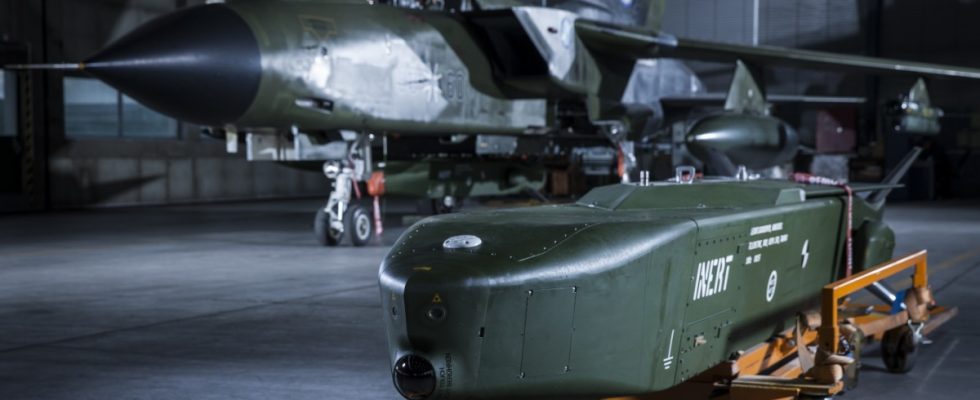When the President of the Bundestag announced the next item on the agenda shortly before half past ten on Thursday, some MPs may have felt a certain feeling of déjà vu. It should now be a Union proposal Taurus and about whether Germany should deliver this cruise missile to Ukraine. Only: The Union faction had already submitted a similar motion in the previous week of the meeting, which is why several traffic light MPs will accuse it of wanting to profit party-politically from an issue that is really too serious for that. “Their record, which they always want to play, is annoying,” says FDP MP Alexander Müller.
However, it is by no means just due to the rebelliousness of the Union faction that the Taurus is already back on the agenda – but also because the traffic light delayed dealing with the Union proposal for a long time. Document 20/9143 had already been referred to the responsible committee in mid-November last year, and it was only now that it was returned to the plenary session.
“Self-serving and base political motivations”
SPD parliamentary group leader Rolf Mützenich does not challenge this. In no other European country, he complains at the beginning of his speech, is there such controversy over a single weapon system as in Germany. But there’s no need to imagine that, not least because “selfish and base political motives are unfortunately fueling the dispute.” In the Union they naturally find this accusation outrageous, but no one in the Greens and FDP is clapping at this point either. As in pretty much every other part of Mützenich’s speech.
In matters Taurus All traffic light partners are dutifully annoyed by the Union. But two of the three coalition members actually don’t want to let up themselves. Or, as Green MP Agnieszka Brugger puts it with regard to the Chancellor’s latest Basta attempt: The danger is too great for a debate to simply be declared over.
The doubts about a “Taurus” levy are particularly great in the East
However, the traffic light’s disagreement on this issue cannot hide the fact that there are also different opinions in the Union faction as to whether Taurus-Applications should really be the method of choice to drive Scholz forward. Because of course they in the CDU and CSU sense that the Chancellor’s insistence on “prudence” could benefit him politically.
Such a peace chancellor dividend could harm the Union in the European elections, but at the latest in the state elections in Brandenburg, Saxony and Thuringia. In the East German CDU associations, the TaurusThe Bundestag faction’s course does not generate any enthusiasm; it is considered difficult to convey in the election campaign. The doubts about one Taurustaxes are particularly large in the east.
This was also shown at the most recent meeting of the Union parliamentary group. There were almost ten requests to speak on the topic. Jens Koeppen from Brandenburg, who was already with the first Taurusvote against the delivery of cruise missiles, reiterated his rejection. He believes that a delivery carries the risk of “elevating the conflict to a new level of escalation.” Others, such as Florian Hahn from the CSU and Johann Wadephul (CDU), objected vehemently. According to participants, it was clear from the applause after the speeches that the overwhelming majority of the group supported the course of its leadership. However, it has also become clear that it does not have to stay that way if more Taurus-Applications would be made, said a member of parliament after the meeting. This is one of the reasons why Thursday’s application may have been the Union’s last such initiative for the time being.
The Union faction remains fairly united when it comes to voting
In any case, everyone in the Union was by no means always in agreement on the issue. The vicious attack by CDU foreign politician Roderich Kiesewetter on Saxon Prime Minister Michael Kretschmer (CDU) last year will not be forgotten. At that time, Kretschmer spoke out against selling the cruise missiles. Kiesewetter then raged: “With your attitude, Ukraine is falling apart and Putin is continuing the war against Moldova and the Baltic states.” Millions of Ukrainians would “then leave their homeland and thus also create a shortage of living space in Saxony. Then you can rightly forget about your re-election.”
In the roll-call vote after the Bundestag debate on Thursday, in addition to Koeppen, former CDU general secretary Mario Czaja and Emmi Zeulner from the CSU voted against their group’s line. The former ministers Peter Ramsauer and Hans-Peter Friedrich (both CSU) as well as Heike Brehmer from Saxony-Anhalt abstained. The Union parliamentary group – which has a total of 197 MPs – remains fairly closed.
The Chancellor’s government survey on Wednesday, in which Scholz harshly attacked CDU foreign politician Norbert Röttgen, may also have contributed to this. In the debate on Thursday, SPD parliamentary group leader Mützenich is also continuing to work on uniting the Union. “So that you from the opposition also understand what this is actually about,” he calls out to the Union faction: In October 2022, the American government feared the use of tactical nuclear weapons in the war in Ukraine. “That should make us sit up and take notice,” said Mützenich. “Turning times” are not “for political players.”
Annette Widmann-Mauz (CDU) then accuses Mützenich of baseless allegations and says that it’s about not allowing yourself to be intimidated by Moscow’s threatening gestures. The CSU MP Hahn calls out to the SPD parliamentary group leader: “Mr. Mützenich, appeasement has never helped against tyrants.” This morning in the Bundestag, the Chancellor is always included. But his place on the government bench remains empty.

